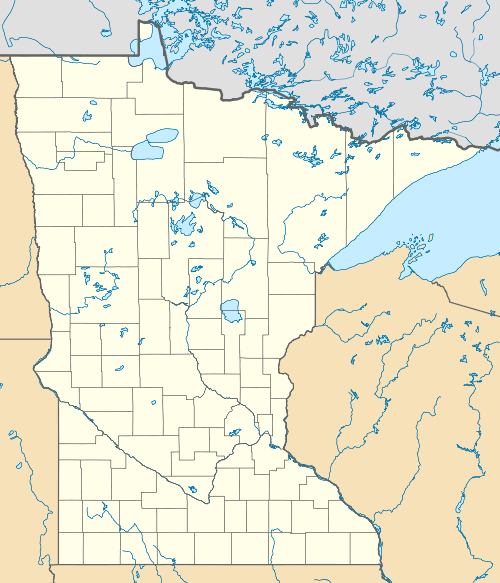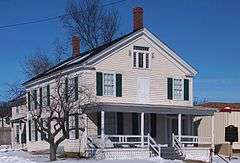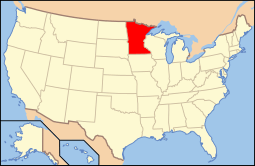Alexander Faribault House
|
Alexander Faribault House | |
|
The Alexander Faribault House from the east | |
  | |
| Location |
12 1st Avenue NE Faribault, Minnesota |
|---|---|
| Coordinates | 44°17′27.7″N 93°16′1.5″W / 44.291028°N 93.267083°WCoordinates: 44°17′27.7″N 93°16′1.5″W / 44.291028°N 93.267083°W |
| Built | 1853 |
| Architect | Alexander Faribault |
| Architectural style | Greek Revival |
| NRHP Reference # | 70000309[1] |
| Added to NRHP | September 22, 1970 |
The Alexander Faribault House is a historic house museum in Faribault, Minnesota, United States. Built in 1853, it was the first wood-frame house constructed in Rice County, Minnesota. It was built by fur trader Alexander Faribault in the Greek Revival style. Besides serving as a house, it also served as a civic center, polling place, and a church. The local address of the house is 12 First Avenue, Faribault, MN. The house was listed on the National Register of Historic Places in 1970.[2]
Alexander Faribault, son of Jean Baptiste Faribault, was a contemporary of Henry Hastings Sibley and served as his secretary for a time. In 1835, Alexander Faribault set up a trading venture at the confluence of the Straight River and the Cannon River. He had a relationship of mutual respect with the Dakota Indians with whom he traded, even to the degree of sheltering friendly Indians during the Dakota War of 1862. In 1853, he built a large frame house. His house reflected his prosperity, with nine bedrooms, a music room, a parlor, a sitting room, an office, a kitchen, a summer kitchen, and a sewing room. Part of his wealth came from "traders' claims" stemming from the Treaty of Traverse des Sioux, but he was also the proprietor of a sawmill and a flour mill. In turn, he was generous to the community, donating $3,000 to Bishop Henry Benjamin Whipple for the church and for Shattuck School. He also donated land for the Seabury Divinity School. He served as a delegate to the Minnesota Territorial Legislature and remained friends with Henry Mower Rice and Henry Hastings Sibley, even though Rice and Sibley were personal and political enemies.[3]
See also
References
- ↑ National Park Service (2007-01-23). "National Register Information System". National Register of Historic Places. National Park Service.
- ↑ Nord, Mary Ann (2003). The National Register of Historic Places in Minnesota. Minnesota Historical Society. ISBN 0-87351-448-3.
- ↑ Kennedy, Roger G. (2006). Historic Homes of Minnesota. Minnesota Historical Society. pp. 72–74. ISBN 0-87351-557-9.
External links
-
 Media related to Alexander Faribault House at Wikimedia Commons
Media related to Alexander Faribault House at Wikimedia Commons - Rice County Historical Society: Alexander Faribault House
- Historic American Buildings Survey: Alexander Faribault House


